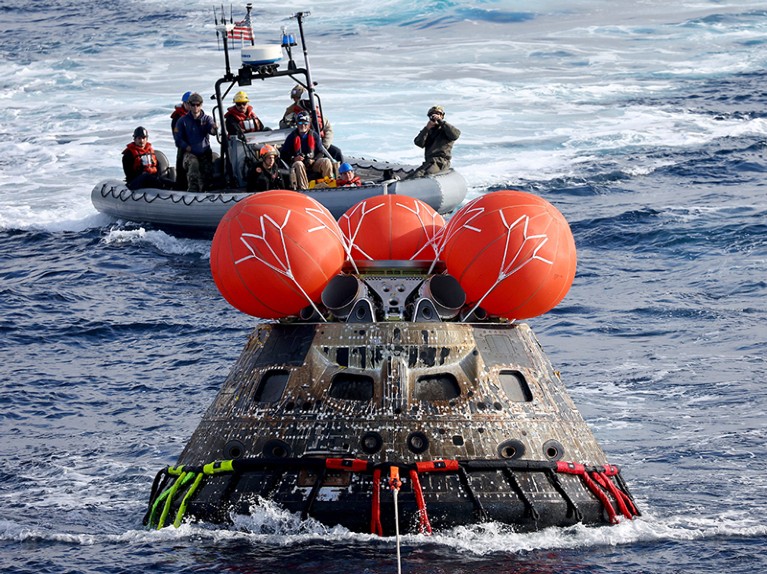Hello Nature readers, would you like to get this Briefing in your inbox free every day? Sign up here

NASA’s Orion capsule was recovered off the coast of Baja California, Mexico, on 11 December.Credit: Mario Tama/AFP/Getty
NASA’s Orion capsule splashed down safely off the coast of Mexico on Sunday after a 25-day trip around the Moon, bringing the Artemis I mission to a close. As planned, Orion executed a daring navigational manoeuvre that saw it skipping across Earth’s atmosphere like a stone on a pond — a first for a capsule that can carry a crew. Artemis II, which aims to launch in 2024 at the earliest, will do a similar lunar loop while carrying astronauts. And Artemis III, likely to fly later in the decade, would land people at the Moon’s south pole, including the first woman on the Moon. Orion’s return to Earth came 50 years to the day after Eugene Cernan and Harrison Schmitt became the last humans to land on the Moon, on the Apollo 17 mission.
“It’s looking a lot like the end of essays as an assignment for education,” says law professor Lilian Edwards about ChatGPT, an artificial intelligence (AI)-powered chatbot that creates uncannily natural text in response to homework and exam-style questions. Others are less worried, pointing out that students have long been able to outsource essays to human ghostwriters. ChatGPT text can also be readily identified by its made-up quotes and irrelevant references. Lecturers could respond by assigning work that prioritizes critical thinking — something that ChatGPT can’t yet do.Are your students using AI to write papers? Take Nature’s poll.
An unseasonal rise in group A Streptococcus (strep A) infections has killed 13 children in England and made many more ill. Strep A infections usually cause just a mild sore throat, but occasionally they can lead to scarlet fever and, rarely, to even more serious conditions, such as meningitis. Some researchers theorize that the off-season outbreaks are a result of past surges that spawned new strep strains, which happened before the pandemic. Public-health rules brought in to stop COVID-19 might have protected children from strep A, too. Now that kids are back in school, and fewer are immune to strep A, it’s surging again. A similar pattern of off-season strep A infections is being observed in other countries, too: in the Netherlands, physicians have been urged to treat suspected cases with antibiotics immediately.
The US National Institutes of Health (NIH) has tentatively planned to stop scoring researchers’ expertise and institutions during grant evaluations. Between 1998 and 2020, 65% of the biomedical funder’s research grant money went to only 10% of institutions. Researchers say the proposal is a good start to correct this institutional bias. Others say that, to solve entrenched problems such as funding disparities between races, bolder action is needed — for example, by including people from under-represented groups on reviewer panels.
Researchers have identified more than 3,500 genetic variations that might affect smoking and drinking behaviour in a study involving almost 3.4 million people with African, American, East Asian and European ancestry. The findings highlight how increasing the sample size and ethnic diversity improves the power of such genome-screening analyses to reveal how various traits are linked to genes, combinations of genes or mutations. “If we can forecast someone’s risk of developing nicotine or alcohol dependence using this information, we can intervene early and potentially prevent a lot of deaths,” says statistical geneticist and study co-author Dajiang Liu.
Features & opinion
Wealthy countries can create prosperity while using less materials and energy if they abandon economic growth as an objective, argues a group of researchers in ecological economics. They outline five key research challenges that will have to be met to re-focus economic activity around securing human needs and well-being. “The question is no longer whether growth will run into limits,” they write, “but rather how we can enable societies to prosper without growth, to ensure a just and ecological future.”
One thing that’s certain about fieldwork is its uncertainty. “The animals we study might not show up, equipment might fail suddenly, the weather might be terrible,” says bioacoustician Anna Osiecka. Clear communication is key to navigate rapidly changing plans. A shared calendar, a WhatsApp group and a daily task list can all help. “Don’t assume that everyone knows what you know,” Osiecka says.
Two-million-year-old DNA that was found in frozen soil has been sequenced, revealing a surprising picture of an ancient landscape. Mastodons, unexpectedly, were among the beasts roaming a lush, forested Greenland. Evolutionary geneticist Eske Willerslev explains how eDNA — DNA found in the environment — is becoming an essential tool for palaeontologists.
On Friday, Leif Penguinson was exploring the caves of Phong Nha-Ke Bang National Park in Vietnam. Did you find the penguin? When you’re ready, here’s the answer.
Just some advance warning that Leif, the team and I will take a short break for the holidays, starting next week. So don’t worry if you don’t see a daily Briefing during that period — although there will be two special editions packed with holiday treats.
Thanks for reading,
Flora Graham, senior editor, Nature Briefing
With contributions by Katrina Krämer and Smriti Mallapaty
We’ve recently launched two new e-mails you might like. They’re free, and of course you can unsubscribe at any time.
• Nature Briefing: Cancer Research — a new weekly newsletter written with cancer researchers in mind. Sign up here to receive the next one.
• Nature Briefing: Translational Research covers biotechnology, drug discovery and pharma. Sign up here to get it free in your inbox each week.

